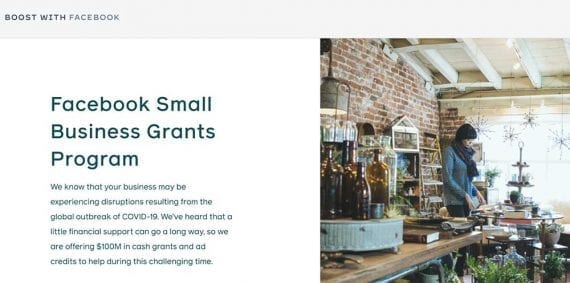Grants and loans from the U.S. government, state and local governments, Facebook, and Google could help small businesses during the Covid-19-induced economic slowdown.
The coronavirus has harmed the retail industry. A Digiday retail-segment survey released on March 30, 2020, “found that 40 percent of top execs expect to have layoffs due to the crisis.”
Not long after this survey was published, Macy’s announced it would furlough 130,000 of its employees due to store closures. And later that same afternoon, Gap, Inc. said it would lay off 80,000 store workers because it, too, had lost nearly all of its revenue.
Even ecommerce-only businesses have faced challenges. Many have faced supply-chain disruptions and weak consumer demand. Moreover, by March 30, 2020, several U.S. states had announced stay-at-home orders that did not allow some ecommerce warehouse operations to stay open.
Fortunately, help may be on the way.
CARES Act
The U.S. Congress passed the “Coronavirus Aid, Relief, and Economic Security Act,” or CARES Act, which will, among other things, provide some $350 billion in small business relief.
The vast majority of these funds will expand the loans available through the U.S. Small Business Administration.
The loans, which are said to be part of a “Paycheck Protection Program,” will be offered to businesses with 500 or fewer employees as of March 1 and with proven, ongoing payroll expenses. The eligible business must also have been harmed by the coronavirus pandemic.
As the SBA explains it, “the Paycheck Protection Program is designed to provide a direct incentive for small businesses to keep their workers on payroll by providing each small business a loan up to $10 million for payroll and certain other expenses…If all employees are kept on the payroll for eight weeks, SBA will forgive the portion of the loans used for payroll, rent, mortgage interest, or utilities. Up to 100 percent of the loan is forgivable.”
The borrowed monies can fund payroll, rent, mortgages, utilities, and debt obligations.
In addition to the Paycheck Protection Program, the CARES Act also allows for increased access to SBA Economic Injury Disaster Loans. These loans may be used for operational expenses and to purchase inventory or equipment. Eligible companies will be able to borrow up to $2 million at 3.75 percent interest for terms of up to 30 years.
State and Local Grants, Loans
Many state and local governments have also announced programs to help small businesses during the pandemic. These programs are typically advertised regionally, and — at the time of writing — included dozens of loan and grant options.
As examples, the California cities of San Francisco, Los Angeles, and Sacramento each announced programs to help their small businesses. Sacramento’s program, which sets aside $1 million for interest-free, small business loans of up to $25,000 each, was so popular the city had to stop accepting applications.
Several websites have attempted to track the various state and local relief options. These sites include:
Ecommerce and omnichannel merchants should check with their state and local governments for coronavirus relief.
Facebook Grants
Facebook has set aside $100 million for small business grants to help offset economic damage from the pandemic. These grants may take the form of cash or advertising credits and will be distributed to as many as 30,000 small businesses across 30 countries in which Facebook does business.

Facebook is providing $100 million in cash and ad credit grants to help small businesses during the coronavirus pandemic.
According to Facebook, the grants may be used to pay employees, cover rent or mortgages, advertise or promote a business, or pay operational expenses.
As of March 30, Facebook had not released eligibility requirements or application details, but they are expected soon. Some companies have reported receiving basic information during consultation calls with Facebook’s Marketing Expert team.
Ecommerce and omnichannel retail business suffering during the pandemic can register for Facebook grant updates.
Google Ad Credits
Google is offering $340 million in advertising credits to small and midsized businesses that have purchased Google Ads over the past year. Ad credit information will appear in the Google Ads application for eligible businesses.
“We have been recommending scaling all our client’s search campaigns now, both Organic Search and Paid Search,” said Joe Rowett, CEO of VELOX Media, a search marketing agency.
“There is an unprecedented shift in buying behavior from brick-and-mortar to ecommerce. This has resulted in a surge in keyword search volumes, and right now this is combined with slightly lower keyword difficulty. This presents a unique opportunity for progressive brands to drive short-term new revenue growth in the largest marketing channels.
“This shift in buying behavior is the start of a long-term upward trend for ecommerce. We recommend launching search campaigns as soon as possible to take advantage of this short-term new revenue growth opportunity. And it is highly profitable revenue growth, generating over 600-percent return on marketing spends,” Rowett added.
Given the likelihood of success with performance marketing, Google’s efforts to help small businesses drive revenue could be valuable.




